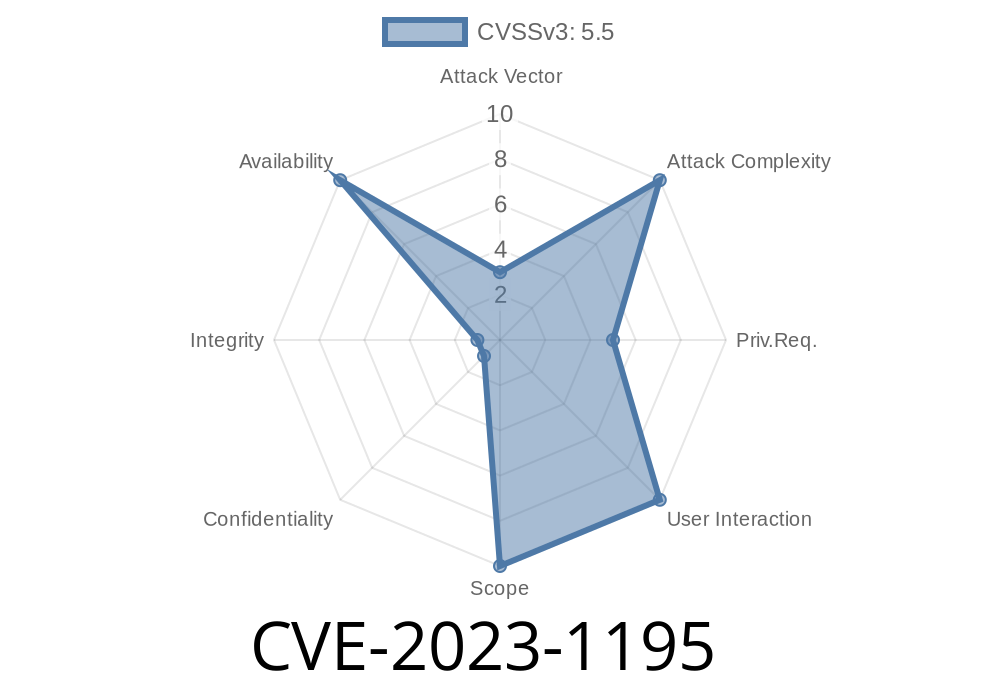The CVE-2023-1195 vulnerability impacted the Linux kernel's Common Internet File System (CIFS) network file-sharing code. Specifically, it exposed a "use-after-free" flaw in how the kernel handled server hostnames via the reconn_set_ipaddr_from_hostname function in the fs/cifs/connect.c file. In this article, we’ll break down what happened, show the critical code section, provide a simple exploit demonstration, and link to original sources for more information.
What Is a Use-After-Free Vulnerability?
A use-after-free bug means a program keeps using a pointer to memory it already released (freed). If an attacker can control or predict what reoccupies the freed memory, they can often corrupt data, crash the system, or even run their own code.
Where Did CVE-2023-1195 Occur?
This CVE specifically targets the Linux kernel's SMB client implementation (CIFS), affecting code paths responsible for managing server hostnames for network shares. The problem arose because, after calling kfree(server->hostname), the pointer wasn't set to NULL. That left open the possibility of the kernel later using a freed pointer, causing undefined and dangerous behavior.
Here’s the heart of the vulnerability, taken right from the Linux kernel before the patch
// fs/cifs/connect.c
void reconn_set_ipaddr_from_hostname(struct cifs_ses *ses, struct cifs_tcon *tcon) {
struct TCP_Server_Info *server = tcon->ses->server;
if (server->hostname) {
kfree(server->hostname); // Free the memory
// Oops! No server->hostname = NULL here.
}
// ...hostname is later used again, but memory is already freed!
}
By not setting server->hostname to NULL after freeing it, future checks (like in reconnection or error recovery code) might attempt to reuse or re-free the already-freed memory, leading to potential kernel panics or, in extreme cases, code execution.
How Could This Be Exploited?
In practice, here's a simplified attack scenario based on CVE-2023-1195 (note that real-world exploitation is more complex and often requires local user access):
User mounts a CIFS share using the kernel client.
2. Through network interruptions or server-induced errors (such as forcibly disconnecting or changing hostname mid-session), the kernel SMB client is forced to re-resolve the server's IP.
But then, under certain recovery races, it might reuse the stale pointer.
4. The kernel accesses freed memory, potentially letting a malicious user craft data, crash the system, or leak kernel information.
This example C-style pseudo-exploit shows the danger
struct TCP_Server_Info *server = ...;
// Legitimate pointer
server->hostname = kmalloc(256, GFP_KERNEL);
strcpy(server->hostname, "fileserver");
// ...some event causes reconnection
kfree(server->hostname); // Freed!
// server->hostname left as dangling pointer
// ...later in recovery
if (server->hostname) { // still not NULL!
printk("%s\n", server->hostname); // Use-after-free!
}
If an attacker knows when this reconnection happens, and can allocate new memory blocks at the same address, they might control what printk prints from kernel space, opening the door to more advanced attacks.
The fix is simple—set the pointer to NULL after freeing
if (server->hostname) {
kfree(server->hostname);
+ server->hostname = NULL;
}
This way, further code will know it's empty and won’t mistakenly access freed memory.
Official Fix
- Upstream Linux kernel patch (commit)
- Red Hat Security Advisory
- CVE Details (NIST)
For educational purposes, a rough simulation using userland C can help
#include <stdio.h>
#include <stdlib.h>
#include <string.h>
int main() {
char *hostname = malloc(20);
strcpy(hostname, "testserver");
free(hostname);
// Pointer not set to NULL!
printf("Hostname: %s\n", hostname); // Use-after-free, undefined behavior
// Fix: hostname = NULL;
}
In the kernel, this could lead to crashes or worse.
Who Is At Risk?
- Linux users running kernels before the fix (March 2023) who use SMB/CIFS client functionality.
Conclusion
CVE-2023-1195 is a textbook example of why setting pointers to NULL after using kfree or free is critical—especially in sensitive kernel code. While this specific bug affects only a niche part (CIFS/SMB client), it demonstrates how subtle memory errors can open serious security holes. Upgrading to a patched kernel is the best protection.
References
- Linux kernel commit fixing CVE-2023-1195
- Red Hat CVE page
- NIST NVD entry
*Stay safe, and remember: always check your pointers!*
Timeline
Published on: 05/18/2023 22:15:00 UTC
Last modified on: 05/26/2023 18:27:00 UTC
